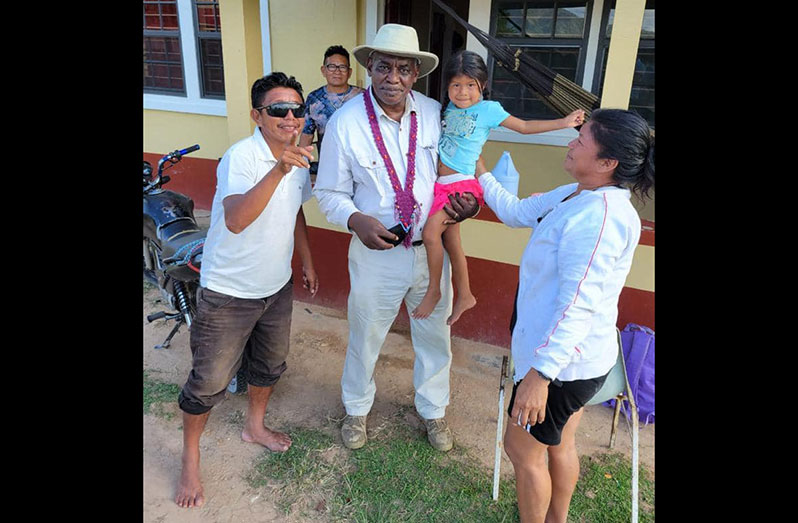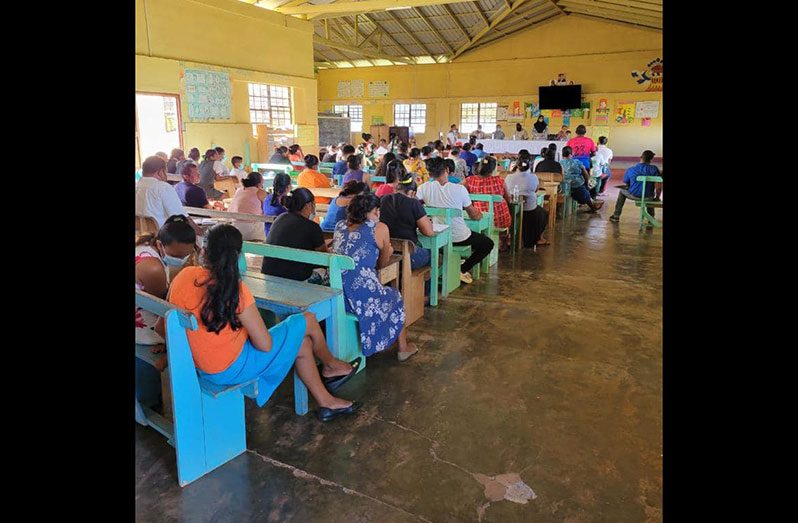–Minister Benn, DPP urge Region Nine residents
HOME Affairs Minister Robeson Benn has called on youths and other residents in Region Nine to take their education seriously during a recent community outreach there.
“We are now in a technologically advanced era, where information is readily available at your fingertips; take advantage of opportunities. Do everything within your power to prevent a police file from reaching the desk of the DPP, who has the difficult task of deciding whether to charge or not to charge,” he said.
The minister, who was accompanied by Director of Public Prosecutions (DPP) Shalimar Ali-Hack, also encouraged the students to get involved in sports, and promised to advocate for sports gear and equipment for them, a release from the Home Affairs Ministry said.
Both Minister Benn and the DPP explained to the residents and the youths that school would allow them to gain the skills and education needed to live successfully, and noted that “A society with high education completion rates will ultimately have a lower crime rate.”
The DPP implored the residents, including school-aged teenagers, to say “no” to illicit drugs, the consumption of alcohol, and early teenage sexual relations.

“Over the last three years, there has been an increased number of police files for sexual offences and the use of illicit drugs received at the DPP’s Chambers for legal advice,” she noted.
Mrs. Ali-Hack also advocated for a return of the training of toshaos to deal with simple offences at the Village Council level, leaving the more severe crimes such as murders, manslaughters, rapes and assaults to be dealt with by the police.
Noting that the return to such a training programme would help alleviate the congestion in the criminal justice system, Mrs. Ali-Hack urged the locals to refrain from illegal activity.
“We train them to cope with such situations, and subsequently the perpetrators are counselled,” she said.
Meanwhile, the residents expressed concern about the road and transportation.
“It was relayed to them of the expected development of the Linden to Lethem Road, as well as the start of the first phase, from Linden to Mabura, and the bridge over the Essequibo River at Kurupakari, which will not only enhance economic opportunities for residents and communities in the Rupununi region, but also significantly decrease the commuting time from Georgetown to Lethem,” the Home Affairs Ministry noted.
DISADVANTAGE
Another concern of residents is the absence of a cell tower in the Karrassabi area, which poses a disadvantage to them, more so to the youths, since they cannot access Internet service for research and school assignments.
The Head of the Community Policing Group Reshi Das, who was also present at the meeting, commissioned a new Community Policing Group in the village of Apoteri (located on the junction of the Essequibo and Rupununi Rivers).
He also spoke to the various community policing groups about security perseveration, and their role in supporting the police and serving the communities. Statement writing, intelligence gathering, customer service, evidence in court, actional intelligence, proactive patrolling and professionalism were some of the areas highlighted.
To date, there are 25 community policing groups in Region Nine, which consists of 311 members in total.
Further, residents and 50 community policing officers were trained and sensitised on the indicators of trafficking in persons (TIP) and the National Referral Mechanism.
Police ranks would be working closely with the CPG to prevent crime, and maintain public peace.
The outreach focussed on the north savannahs, particularly Annai and Karrassabi, and their satellite communities.
“The residents were sensitised on several social and economic issues related to sexual offences (rape, teenage pregnancy, domestic abuse, etc.), alcoholism, drug use and trafficking, cattle rustling, simple larceny and trafficking in persons. They were also sensitised on the importance of Community Policing and Community Policing Groups (CPG),” the ministry noted.
Minister Benn and the DPP were accompanied by the Regional Chairman, Brian Allicock; Police Commander of Regional Division Nine Raphael Rose, and a technical team from the ministry.
The ministry also noted that attention was placed mainly on issues and challenges in the different schools and the dormitories.


.jpg)











